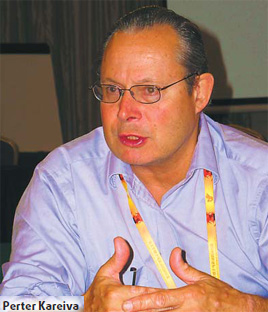

Editor's notes: There seems to be an inherent contradiction between nature conservation and traditional economic development.
Historically, preserving nature often meant a loss of economic benefits.
But Peter Kareiva, chief scientist at the Nature Conservancy, a US-based non-government organization with more than 1 million members, is working on a new conservation concept.
On a recent visit to China, he talked with China Business Weekly reporter Li Jing about "ecosystem services."
Q: So what services does the ecosystem provide? How do we human beings benefit from the services of nature?
A: Human beings have known for centuries that nature has tremendous assets that are key to human well-being and that have concrete economic value.
Nature not only provides us food, water, fuel and fiber; it also helps to prevent soil erosion and floods.
For instance, scientists have found out that areas such as mangroves that are buffered by coastal forests were strikingly less damaged by the 2004 tsunami than areas without tree vegetation. Nature also bears cultural and spiritual value for human beings.
But with a global population soon to number 9 billion people, the environment is becoming so degraded that many regions in the world risk ecological collapse.
When we destroy natural ecosystems, we lose these assets and the services they provide to us.
Putting an accurate value on these ecosystem services could make protecting those services even more attractive to business, policymakers and the public.
Q: Could you elaborate about why this idea of ecosystem services is so important to conservation?
A: We've just begun the process of valuing ecosystem services through efforts such as the Natural Capital Project, initiated by the Nature Conservancy, Stanford University and World Wildlife Fund.
Even if nature preserves covered 30 percent of the Earth's surface, those protected areas would have no chance of surviving if we allow ecosystem services to degrade in the other 70 percent. Human demand on that 30 percent for resources would be overwhelming.
In fact, it's becoming increasingly clear that the goals of conservation and the goals of alleviating poverty and improving human health are deeply interwoven.
Protecting ecosystem services does not guarantee improved human well-being or enhanced biodiversity.
But if we don't start linking the needs of humanity and nature, all our efforts are guaranteed to fail.
Q: How does "ecosystem services" function?

A: There are two levels on which we do ecosystem services.
At one level, you just do the science and studies to talk about how projects such as hydropower\\oil exploitation or coal mining will impact fish production, water quality, the water supply, flood control and carbon sequestration.
You wouldn't need to convert it to dollars. In many countries, that's sufficient, because the governments just want a fair representation of the consequences.
In a lot of places, though, you may need to start the next stage and calculate the dollar values of all those. For example, for an energy project such as mining, the science could tell you where the mining will do the least damage.
Where it does damage, we calculate how much it does. Then the company or the operation has to do "offset mitigation" - spend money on conservation. The mining reduces soil quality and does the damage, so it has to spend some money elsewhere.
Alternately, you could simply change the operation so you don't do the damage.
With hydropower utilities, for instance, the company generates the most electricity when there are steady water flows. And the hydropower company can maintain stable water flows if they invest in forestation in the upper stream.
Nature doesn't charge for what it does. But if we offer the same things as nature does, we would charge a fee.
(China Daily 08/31/2009 page3)













